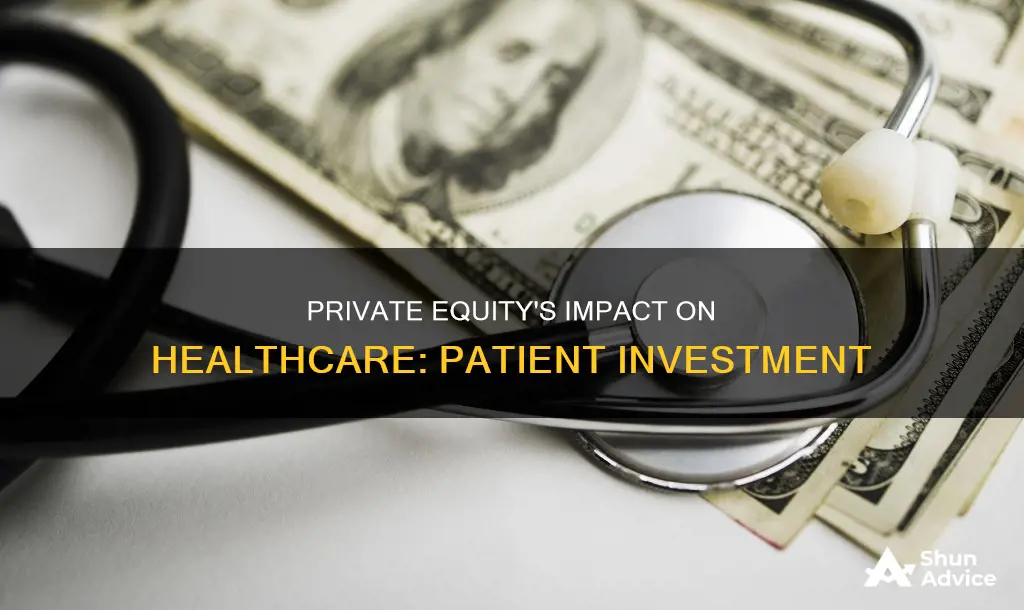
Private equity investment in healthcare is a rapidly growing phenomenon, with investors spending over $1 trillion in the last decade. This trend has sparked concerns about the impact of private equity on healthcare costs, equity, and patient access. Private equity ownership in healthcare is associated with increased healthcare prices, utilization, and costs for patients and society. While some argue that private investment can bring much-needed capital and management expertise to struggling hospitals, others worry that profit incentives may overshadow patient care and safety. Studies examining the effects of private equity ownership on patient outcomes in nursing homes found a 10% increase in short-term mortality and a decline in nurse staffing and compliance with care standards. These findings underscore the complex implications of private equity investment in healthcare and the need for further research to understand its impact on patient welfare.
| Characteristics | Values |
|---|---|
| Private equity investment in healthcare | Increased by more than 1900% over the past two decades |
| Private equity investment in nursing homes | Increased short-term mortality by 10% |
| Increased taxpayer spending by 11% | |
| Reduced nurse availability per patient | |
| Reduced compliance with Medicare standards of care | |
| Increased operating costs | |
| Private equity investment in hospitals | Increased patient complications |
| Increased hospital-acquired complications by 25% | |
| Increased patient falls by 27% | |
| Increased bloodstream infections by 38% | |
| Private equity investment in physician practices | Increased by $200 billion in 2021 |
What You'll Learn

Private equity investment in nursing homes
Impact on Patient Outcomes
Several studies have indicated that private equity ownership of nursing homes is associated with adverse effects on patient well-being and increased mortality rates. Research suggests that there is an 11% increase in mortality among Medicare patients in privately owned nursing homes. This can be attributed to factors such as reduced nursing staff, lower-risk patient selection, and a decline in compliance with care standards. Additionally, private equity ownership has been linked to a higher likelihood of hospitalisations and emergency room visits for residents when compared to other for-profit homes.
Financial Considerations
Private equity firms are attracted to the nursing home sector due to its profitability and valuable real estate holdings. They employ various strategies to maximise profits, such as reducing staff levels or hours, increasing charges and prices, and focusing on high-revenue procedures. These cost-cutting measures can have a detrimental impact on the quality of care provided to residents. The short-term financial focus of private equity firms often prioritises profits over patients, leading to concerns about the impact on healthcare costs for both individuals and society as a whole.
Regulatory Response
The impact of private equity investment in nursing homes has caught the attention of regulatory bodies, including the Government Accountability Office (GAO) in the United States. Investigations and probes have been initiated to examine the ownership of nursing homes by private equity firms and their effects on resident health outcomes and staff working conditions. Policymakers are also considering new transparency rules to clarify the ownership of private, for-profit healthcare organisations, as well as reforms to antitrust laws to scrutinise the sale of local physician practices.
Broader Context in Healthcare
The interest of private equity firms in nursing homes is part of a broader trend of investments in the healthcare sector. Private equity investors spent over $200 billion on healthcare acquisitions in 2021 alone, with a total of $1 trillion invested in the past decade. This includes acquisitions of hospitals, nursing homes, and home care settings, as well as an increasing number of physician practices in high-margin specialties. The growing role of private equity in healthcare has raised concerns about the impact on healthcare costs, equity, and access, particularly for underserved and rural communities.
Unlocking Private Equity Investment Opportunities in India
You may want to see also

The impact of private equity on patient mortality
Private equity's role in healthcare is rapidly growing, with investments in the industry increasing 20-fold from $5 billion in 2000 to $100 billion in 2018. This growth has been driven by several factors, including the fragmented delivery of care, the recession-resistant nature of healthcare, and the aging population. While proponents of private equity argue that it provides capital and management expertise to improve quality and clinical standards, there are concerns about the impact of private equity on patient mortality.
Nursing Homes
A study by Gupta et al. found that private equity ownership of nursing homes leads to a 10-11% increase in patient mortality. The study also showed declines in patient well-being, nurse staffing, and compliance with care standards, which contributed to the increased mortality rate. Another study by Pradhan and Weech-Maldonado reviewed the relationship between private equity ownership and nursing home performance and found worse quality metrics, staffing ratios, and higher mortality rates despite higher Medicare reimbursements.
Hospitals
Other Healthcare Settings
Overall Impact
While the impact of private equity on patient mortality varies depending on the healthcare setting, there are concerns about the prioritization of profits over patient care. The short-term focus on revenue and cost-cutting measures may lead to adverse outcomes for a subset of patients, particularly in underserved areas where access to care is already limited. More research is needed to fully understand the impact of private equity on patient mortality and to develop effective policies to address these concerns.
Diversifying Investments in India: Strategies for Success
You may want to see also

Private equity's role in physician practices
Private equity firms are attracted to healthcare because of the potential for high returns and the opportunity to exploit weaknesses in the current healthcare market. They are particularly interested in acquiring high-margin specialist practices, such as dermatology, urology, gastroenterology, and cardiology. The acquisition strategy typically involves linking a private equity-owned physician management company with a physician-owned medical group, often a large "platform" practice with a substantial community footprint. The private equity firm then grows the value of the medical group by recruiting additional physicians, acquiring smaller practices, expanding its market reach, and decreasing costs.
The appeal of private equity investment for physicians lies in the ability to quickly scale a practice with minimal financial risk, the promise of administrative support, and the lucrative financial offer. However, there are also several downsides and concerns. Private equity investment may lead to a loss of autonomy and control for physicians, with profit-driven practices and policies that may conflict with the mission of providing the best possible patient care. It can also result in decreased compensation for physicians and potentially lower the quality of healthcare on a societal level.
The impact of private equity investment in physician practices is complex and multifaceted. While it can provide benefits such as increased efficiency and improved technology, it also raises questions about the long-term implications for practice stability, physician recruitment, quality, and safety. The rapid growth of private equity in this sector has led to increased scrutiny and calls for greater transparency and regulatory oversight.
Understanding Investment Management vs Private Equity
You may want to see also

The corporatization of healthcare
Impact on Patients
Private equity investment in healthcare has led to concerns about its effects on patients. One of the primary worries is the potential compromise in the quality of care. Studies have shown that private equity ownership of hospitals and nursing homes is associated with adverse outcomes, including increased patient complications, such as higher rates of falls, infections, and other preventable conditions. Additionally, there are concerns about the impact on healthcare costs, with private equity firms tending to increase prices and utilization, ultimately leading to higher costs for patients and society.
Impact on Clinicians
Impact on Healthcare Organizations
Future Implications
As the corporatization of healthcare continues to evolve, there are growing calls for regulatory interventions and increased transparency in private equity acquisitions. Policymakers, insurance companies, and public sector bodies are increasingly concerned about protecting patients and societal resources from the potential negative consequences of private equity transactions. Additionally, there is a need to balance central corporate governance with strong local community board governance to ensure that patient care remains a top priority.
Actively Managed Investments: What Are They?
You may want to see also

Regulatory actions in the nursing home industry
The US Government Accountability Office (GAO) has identified significant weaknesses in federal and state oversight of nursing homes. In response, the Centers for Medicare & Medicaid Services (CMS) has implemented several initiatives to improve the consistency and rigor of nursing home surveys. However, some key initiatives are still in the developmental stage and have not yet been implemented.
Inconsistency in state surveys
GAO data reveals continued wide interstate variability in the proportion of nursing homes found to have serious deficiencies. For example, in the most recent time period, one state found such deficiencies in about 6% of homes, whereas another state found them in about 54% of homes.
Understatement of serious deficiencies
There is also an increase in discrepancies between federal and state surveys of the same homes from 2002 through 2004, indicating continued understatement of serious deficiencies by state surveyors. In five large states that had a significant decline in serious deficiencies, federal surveyors concluded that from 8% to 33% of the comparative surveys identified serious deficiencies that state surveyors had missed.
Key challenges
Key challenges to further improving nursing home quality and safety include:
- The cost to retrofit older nursing homes with automatic sprinklers to help reduce the loss of life in the event of a fire
- Continuing problems with hiring and retaining qualified surveyors
- An expanded workload due to increased oversight, the identification of additional initiatives, and growth in the number of Medicare and Medicaid providers
Private equity investment in healthcare patients
Private equity's role in healthcare is rapidly growing, particularly through acquisitions of high-margin specialist practices. Private equity investors spent more than $200 billion on healthcare acquisitions in 2021 alone, and $1 trillion in the past decade.
There are concerns over the impact of private equity ownership on healthcare costs, equity, and access. Private equity ownership tends to increase healthcare prices and utilization, thus increasing costs to both patients and society. There is also a widely cited study that showed a 10% increase in mortality among Medicare patients in nursing homes acquired by private equity owners.
Understanding Client Needs: An Investment Manager's Guide
You may want to see also
Frequently asked questions
Strictly speaking, private equity in healthcare is a form of for-profit ownership reflecting investment in healthcare facilities by private parties.
UnitedHealth Group, which owns thousands of physician practices.
Hospital Corporation of America.
Private equity generates revenue by charging management fees to its investors and by focusing on high-revenue procedures, cost-cutting, reorganization, and financial engineering.
Private equity ownership increases short-term mortality by 10% and spending by 11%–19%, the vast majority of which is billed to taxpayers.







